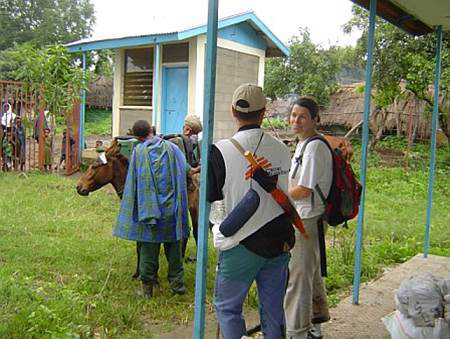Liberia: Working with Doctors Without Borders
-
-
slice.mit.edu
- 1
Filed Under
Recommended
Kathy MacLaughlin Dedieu MEng ’99 flew to China during the virulent SARS epidemic in 2003 for her first assignment with Doctors Without Borders (Médecins Sans Frontières or MSF)

Thanks to her prior experience with the engineering firm CDM working on Superfund sites, she used her knowledge of safety precautions to teach others how to avoid spreading contamination. On subsequent assignments in Bangladesh, South Sudan, and Uganda, she specialized in water and sanitation needs as well as infectious disease control.
This past August, just days after she and her husband had relocated from Massachusetts to Paris, MSF called her up for the Ebola crisis in Liberia. She immediately flew to Monrovia, where MSF has its largest treatment center.
“There is basically almost no other health care happening in Monrovia," she says. "My work was a bit of a mix with more infection control than actual Ebola experience, but still pretty darn interesting!” she wrote.
“My team looked at health structures, which have been either closed or are functioning on a very limited basis in this city of 1.3 million. As the epidemic worsened, more places closed and/or had health workers affected,” she said. “It was very striking to me to think about people with respiratory infections, malaria, or complicated pregnancies who had nowhere to go.”
Dedieu’s team recommended that MSF open a program to address the lack of health services, and the project has already started. With malaria a chronic threat, MSF will carry out mass distributions of treatments targeting 300,000 people. She said, “We will work on opening primary and secondary health care centers in Monrovia safely over the next few months through infection control training and ensuring proper water, sanitation and personal protective equipment (PPE) to the health care workers.”
Along with her duties as a water and sanitation engineer and PPE specialist, Dedieu also provided the vital logistics for setting up the mission with an office, warehouse, cars, and supplies.
Dedieu’s experience with emergency assistance began at MIT with “an inspiring class with Professor Jan Wampler in architecture about rebuilding Central America after the terrible damage caused by Hurricane Mitch. We designed some new housing for Tegucigalpa, Honduras, with drains and sewers, and we went down and presented it to the mayor.”
Later, while working in Hong Kong for CDM, Dedieu was involved in a fundraiser for MSF. Finding out that they needed engineers, “I went through the recruitment process, left my well-paying job and never looked back.” After working for MSF exclusively for some years, she became a recruiter and helped them choose their personnel.
Now back in Paris, Dedieu continues to work on Liberian health. She encourages other engineers to consider getting involved with MSF: “The experience is extraordinary. It’s impossible to feel more of use, and you absolutely get more than you give.”
Related topic: Learn about HealthMap, cofounded at Boston Children’s Hospital by Clark Freifeld SM ’10, to help track ebola and other infectious diseases, published in Spectrum.








Comments
Connie & Kate
Sat, 10/25/2014 9:13pm
You are our hero!!!